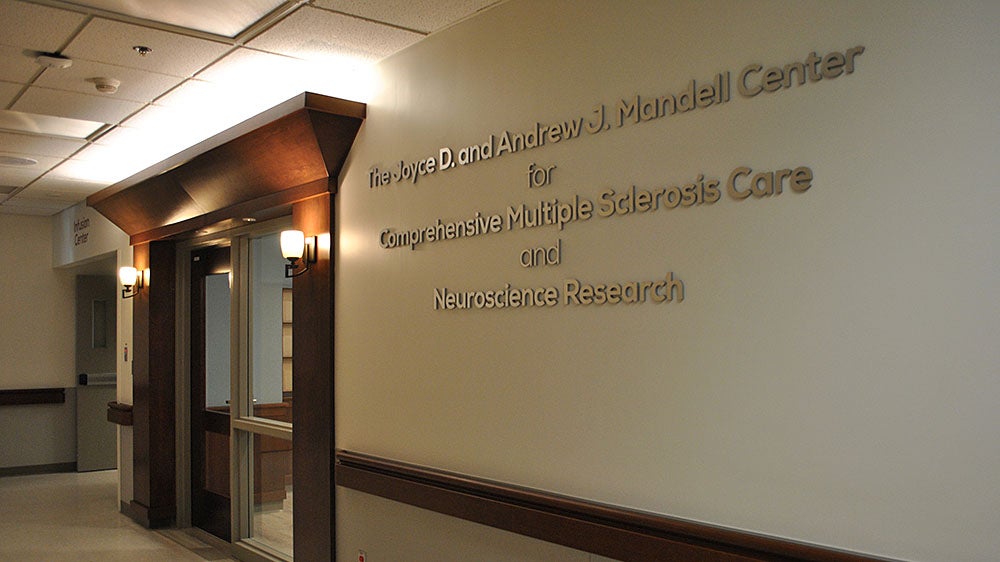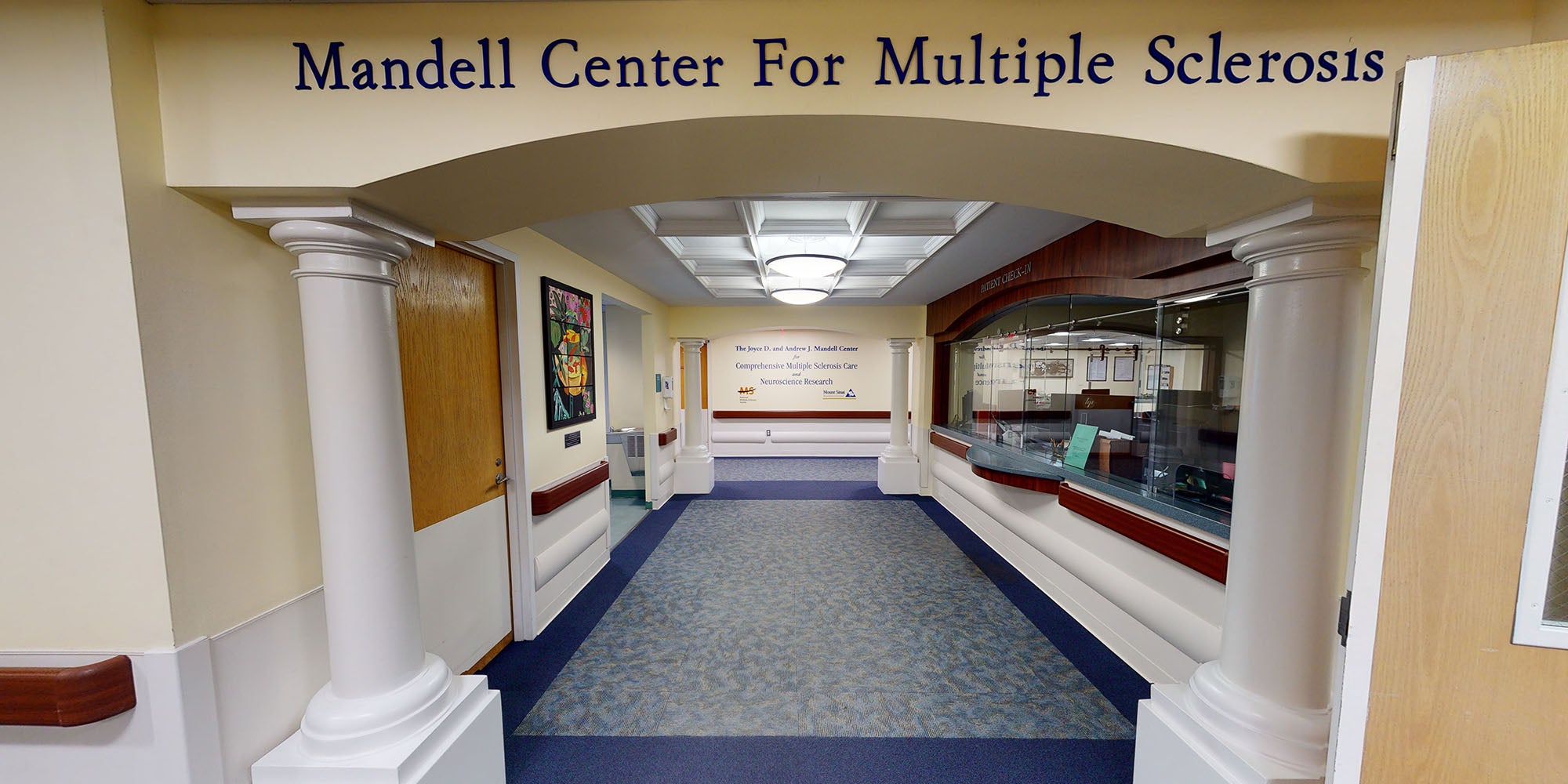Multiple Sclerosis (MS) Research
Contact UsResearch for MS is about more than finding a cure.
At Trinity Health Of New England, researchers are working to improve everyday life, functionality and quality of life for patients with MS. Our researchers study the consequences of the disease and integrate findings into updated care models. This research impacts and improves the quality of care we provide for patients.
MS Research at Trinity Health Of New England
Our patients receive expert care built upon a foundation of innovative research. At the Mandell MS Center, you benefit from:
- Academic studies in a clinical setting: Patients with an MS diagnosis have the option to participate in studies at the same place they receive MS care. Our clinicians and researchers work together to quickly incorporate the newest protocols into your MS treatment.
- Leading-edge research: Researchers from the Mandell MS Center lead international symposiums that focus on bridging the gap between expert researchers, clinicians and patients with MS. We develop, test and practice innovative treatments and comprehensive care for MS.
- Advanced care close to home: We offer you access to cutting-edge research studies designed to improve MS care in two locations across Connecticut.
How Our MS Studies Benefit You
We conduct innovative academic studies right at the Mandell MS Center. Our teams learn and implement the newest care models as soon as they are available, giving you the most advanced MS care options. A partnership between our researchers and providers leads to early intervention and better quality of care sooner.
Types of MS Research Studies We Offer
Our research program thrives on patient participation. We offer a variety of ways for you to get involved in our research projects. If you like, our research staff will contact you directly when we’re recruiting for new studies, surveys and focus groups.
Search our MS research studies
Our Innovative MS Team
The researchers at the Mandell MS Center are passionate about improving the lives of people living with MS. They collaborate with national and international experts in the field to design and conduct meaningful studies.
The MS research we do is recognized both nationally and abroad. To continue the growth of MS research, we also offer research fellowships for the advanced study of MS.
See list of our publications
- Ruiz J, Labas MP, Triche EW, Lo AC. Combination of robot-assisted and conventional body-weight-supported treadmill training improves gait in persons with multiple sclerosis: a pilot study. J Neurol Phys Ther. 2013 Dec;37(4):187-93. doi: 10.1097/NPT.0000000000000018. PMID: 24189336.
- Gromisch, E.S., Portnoy, J.G., & Foley, F.W. (2018). Comparison of the abbreviated Minimal Assessment of Cognitive Function in Multiple Sclerosis (aMACFIMS) and the Brief International Cognitive Assessment for Multiple Sclerosis (BICAMS). Journal of the Neurological Sciences, 388, 70-75. doi:10.1016/j.jns.2018.03.012.
- Gunderson, C.G, Gromisch, E.S, Chang, J.J, Malm, B.J. Derivation of a Clinical Model to Predict Unchanged Inpatient Echocardiograms. J Hosp Med. 2018 Mar 1;13(3):164-169. doi: 10.12788/jhm.2866. Epub 2017 Oct 18. PMID: 29073315.
- DelMastro, H.M., Ruiz, J.A., Gromisch, E.S., Garbalosa, J.C., Triche, E.W., Olson, K.M., & Lo, A.C. 2018). Quantification characteristics of digital spiral analysis for understanding the relationship among tremor and clinical measures in persons with multiple sclerosis. Journal of the Neuroscience Methods. 307: 254-259. doi: 10.1016/j.jneumeth.2018.06.016.
- Gromisch, E.S., Portnoy, J.G., & Foley, F.W. (2018). Response to screening ability of cognitive function by two measures in patients with multiple sclerosis. Journal of the Neurological Sciences. 391: 154-155. doi: 10.1016/j.jns.2018.06.009.
- Beier, M., Gromisch, E.S., Hughes, A., Alschuler, K.N., Madathil, R., Chiaravalloti, N., & Foley, F.W. (2017). Proposed cut scores for tests of the Brief International Cognitive Assessment of Multiple Sclerosis (BICAMS). Journal of the Neurological Sciences, 381, 110-116. doi: 10.1016/j.jns.2017.08.019.
- Gromisch, E.S., Sloan, J., Zemon, V., Tyry, T., Schairer, L.C., Snyder, S., & Foley, F.W. (2018). Development of the Multiple Sclerosis Resiliency Scale (MSRS). Rehabilitation Psychology. 63: 357-364. doi:10.1037/rep0000219.
- Gromisch, E.S., Fiszdon, J.M., & Kurtz, M.M. (2020). The effects of cognitive-focused interventions on cognition and psychological well-being in persons with multiple sclerosis: a meta-analysis. Neuropsychological Rehabilitation. 30: 767-786. doi: 10.1080/09602011.2018.1491408.
- Neto, L., Gromisch, E.S., Sloan, J., Tyry, T., & Foley, F.W. (2019). Sex differences in predictors of illness intrusiveness in persons with multiple sclerosis. Quality of Life Research. 28: 389-397. doi:10.1007/s11136-018-2023-0.
- Gromisch, E.S., Kerns, R.D., & Beauvais, J. (2019). “I battle pain every single day”: pain-related illness intrusiveness among persons with multiple sclerosis. Rehabilitation Psychology. 64: 269-278. doi: 10.1037/rep0000273
- Gromisch, E.S., Beauvais, J., Iannone, L., & Marottoli, R. (2019) Optimizing Clock Drawing Scoring Criteria: Development of the West Haven-Yale Clock Drawing Test. Journal of the American Geriatrics Society. 67; 2129-2133. doi: 10.1111/jgs.16047.
- Beier, M., Hughes, A.J., Williams, M.W., & Gromisch, E.S. (2019) Brief and cost-effective tool for assessing verbal learning in multiple sclerosis: comparison of the Rey Auditory Learning Test (RAVLT) to the California Verbal Learning Test-II (CVLT-II). Journal of the Neurological Sciences. 400: 104-109. doi: 10.1016/j.jns.2019.03.016.
- Mascialino, G., Gromisch, E.S., Zemon, V., & Foley, F.W. (2019). Potential differences in cognition by race/ethnicity among persons with multiple sclerosis in a clinical setting: a preliminary study. NeuroRehabilitation. 44: 445-449. doi: 10.3233/NRE-182654.
- Gromisch, E.S., Kerns, R.D., Czlapinski, R., Beenken, B., Otis, J., Lo, A.C., & Beauvais, J. (2019). Cognitive-behavioral therapy for the management of multiple sclerosis-related pain: a randomized clinical trial. International Journal of MS Care. doi: 10.7224/1537-2073.2018-023.
- Gromisch, E.S., Kulas, J.F., Altalib, H., Kerns, R.D., Mattocks, K.M., Brandt, C.A., & Haskell, S (In Press). Neuropsychological assessments and psychotherapeutic services in Veterans with multiple sclerosis: rates of utilization and their associations with socio-demographics and clinical characteristics using Veterans Health Administration-based data. Multiple Sclerosis and Related Disorders. doi:10.1016.j.msard.2020.102220.
- Gromisch, E.S., Kerns, R.D., & Beauvais, J. (2020). Pain-related illness intrusiveness is associated with lower activity engagement among persons with multiple sclerosis. Multiple Sclerosis and Related Disorders. 38. doi: 10.1016/j.msard.2019.101882.
- Hughes, A.J., Patel, K.S., Fitzgerald, K.C., Brown, A., Gromisch, E.S., & Mowry, E.M. (2020). Reliability and validity of the Multiple Sclerosis Resiliency Scale (MSRS). Journal of the Neurological Sciences. doi: 10.1016/j.jns.2020.116983.
- Miller, J.R., Altaras, C., Vissicchio, N.A., Zemon, V., Portnoy, J.G., Gromisch, E.S., Sloan, J., Tyry, T., & Foley, F.W. (2020) The influence of trait mindfulness on depression in multiple sclerosis: potential implications for treatment. Quality of Life Research. doi: 10.1007/s11136-020-02567-6.
- Gromisch, E.S., Turner, A.P., Leipertz, S.L., Beauvais, J., & Haselkorn, J.K. (2020). Risk factors for suboptimal medication adherence in persons with multiple sclerosis: development of an electronic health record-based explanatory model for disease modifying therapy use. Archives of Physical Medicine and Rehabilitation. 101: 807-814. doi: 10.1016/j.apmr.2019.11.005.
- Chang, J., Guo, X., Rao, V., Gromisch, E.S., Chung, S., Kluger, H.M., Cha, C., Gorelick, F., Testani, J., Safirstein, R., Crowley, S., Peixoto, A.J., & Desir, G.V. (2020). Identification of two forms of human plasma renalase, and their association with all-cause mortality. Kidney International Reports. 5: 362-368. doi: 10.1016/j.ekir.2019.12.002.
- Gromisch, E.S., Turner, A.P., Leipertz, S.L., Beauvais, J., & Haselkorn, J.K. (2020) Who is not coming to clinic? A predictive model of excessive missed appointments in persons with multiple sclerosis. Multiple Sclerosis and Related Disorders. 38. doi: 10.1016/j.msard.2019.101514.
- Gromisch, E.S. & Foley, F.W. (2020). Can semantic fluency be used as an alternative or additional measure in the abbreviated Minimal Assessment of Cognitive Function in Multiple Sclerosis (aMACFIMS)? Journal of the Neurological Sciences. 410. doi: 10.1016/j.jns.2019.116640.
- Neto, L.O., Gromisch, E.S., Sloan, J., Tyry, T., & Foley, F.W. (2020) The relationship between aspects of resiliency and intimacy-related illness intrusiveness in males with multiple sclerosis. Sexuality and Disability. 38: 135-145. doi: 10.1007/s1119/5-019-09609-z.
- O’Nell-Meyer, H., Wei, O.E., Ruiz, J.A., Wade, P.B., Neto, L.O., & Gromisch, E.S. (2021). Risk factors for infusion-related reactions following ocrelizumab infusion in a community setting: development of an electronic medical record-based explanatory model. Multiple Sclerosis and Related Disorders. 48. doi: 10.1016/j.msard.2020.102700.
- Gromisch, E.S., Neto, L., Sloan, J., Tyry, T., & Foley, F.W. (2021). Using the Multiple Sclerosis Resiliency Scale identify psychological distress in persons with multiple sclerosis. Multiple Sclerosis and Related Disorders. 53. doi:10.1016/j.msard.2021.103079.
- Gromisch, E.S., & Dhari, Z. (2021). Identifying early neuropsychological indicators of cognitive involvement in multiple sclerosis. Neuropsychiatric Disease and Treatment. 17. doi: 10.2147/NDT.S256689.
- Gromisch, E.S., Neto, L.O., & Turner, A.P. (2021). What biopsychosocial factors explain self-management behaviors in multiple sclerosis? The role of demographics, cognition, personality, and psychosocial and physical functioning. Archives of Physical Medicine and Rehabilitation. doi: 10.1016/j.ampr.2021.05.012.
- Heppe, D.B., Beard, A.S., Cornia, P.B., Lankarani-Fard, A., Bradley, J.M., Guidry, M.M., Kwan, B., Jagannath, A., Tuck, M., Fletcher, K.E., Gromisch, E.S., & Gunderson, C.G. (2020). A multicenter study of the format and content of internal medicine morning report. Journal of General Internal Medicine. doi: 10.1007/s11606-020-06069-6.
- Gromisch, E.S., Turner, A.P., Haselkorn, J.K., Lo, A.C., & Agresta, T. (2021). Mobile health (mHealth) usage, barriers, and technological considerations in persons with multiple sclerosis: a literature review. JAMIA Open. doi: 10.1093/jamiaopen/ooaa067.
- Money KM, Mahatoo A, Samaan S, Anand P, Baber U, Bailey M, Bakshi R, Bouley A, Bower A, Cahill J, Houtchens M, Katz J, Lathi E, Levit E, Longbrake EE, McAdams M, Napoli S, Raibagkar P, Wade P, Sloane JA. A New England COVID-19 Registry of Patients With CNS Demyelinating Disease: A Pilot Analysis. Neurol Neuroimmunol Neuroinflamm. 2021 Aug 2;8(5):e1046. doi: 10.1212/NXI.0000000000001046. PMID: 34341094; PMCID: PMC8362350.
- Dhari Z, Leonetti C, Lin S, Prince A, Howick J, Zurakowski D, Wang PC, Jonas RA, Ishibashi N. Impact of Cardiopulmonary Bypass on Neurogenesis and Cortical Maturation. Ann Neurol. 2021 Dec;90(6):913-926. doi: 10.1002/ana.26235. Epub 2021 Oct 13. PMID: 34590341; PMCID: PMC8639674.
- Gromisch ES, DeLuca J, Benedict RHB, Foley FW. Managing Cognitive Dysfunction in Multiple Sclerosis: A Snapshot of Changes in Screening, Assessment, and Treatment Practices. Int J MS Care. 2022 May-Jun;24(3):104-109. doi: 10.7224/1537-2073.2020-139. Epub 2021 Sep 13. PMID: 35645626; PMCID: PMC9135367.
- Gromisch, E.S., Turner, A.P., Neto, L.O., Haselkorn, J.K., & Raskin, S.A. (2022). Identifying prospective memory deficits in multiple sclerosis: Criterion and preliminary ecological validity of a single item version of the Memory for Intentions Test (MIST). The Clinical Neuropsychologist. doi: 10.1080/13854046.2022.2062451.
- Gromisch, E.S., Turner, A.P., Neto, L.O., Ruiz, J.A., Lo, A.C., Agresta, T., & Foley, F.W. (2022). Establishing the test-retest reliability and minimal detectable change of the Multiple Sclerosis Resiliency Scale (MSRS). International Journal of MS Care. doi: 10.7224/1537-2073.2021-126.
- Gromisch, E.S., Turner, A.P., Leipertz, S.L., Neto, L.O., Beauvais, J., & Haselkorn, J.K. (2022). Comorbidities as predictors of all-cause emergency department utilization among Veterans with multiple sclerosis. Multiple Sclerosis and Related Disorders. doi: 10.1016/j.msard.2022.103806.
- Gomes, K., Ruiz, J.A., Raskin, S.A., Turner, A.P., DelMastro, H.M., Neto, L.O., & Gromisch, E.S. (2022) The role of cognitive impairment on physical therapy attendance and outcomes in multiple sclerosis. Journal of the Neurologic Physical Therapy. 46: 34-40. doi: 10.1097/NPT. 0000000000000375.
- Gromisch, E.S., Turner, A.P., Leipertz, S.L., Beauvais, J., & Haselkorn, J.K. (2022) Demographic and clinical factors are associated with frequent short-notice cancellations in Veterans with multiple sclerosis on disease modifying therapies. Archives of Physical Medicine and Rehabilitation. 103: 915-920. doi: 10.1016/j.ampr.2021.10.004.
- Gromisch, E.S., DeLuca, J., Benedict, R.H.B., & Foley, F.W. (2022) Managing cognitive dysfunction in multiple sclerosis: A snapshot of changes in screening, assessment, and treatment practices. International Journal of MS Care. 24: 104-109. doi: 10.7224/1537-2020-139.
- DelMastro, H.M., Ruiz, J.A., Simaitis, L.B., Gromisch, E.S., Neto, L.O., Cohen, E.T., Wong, E., Krug, R.J., & Lo, A.C. (In Press). The effect of backwards walking and forwards walking on lower limb strength, balance, and gait in persons with multiple sclerosis: a pilot randomized feasibility trial. International Journal of MS Care.
- Gromisch, E.S., Turner, A.P., Gangi, A., Neto, L.O., & Foley, F.W. (2022). What factors are associated with resilience in persons with multiple sclerosis? The role of personality traits. Rehabilitation Psychology. doi: 10.1037/rep0000468.
- Gromisch ES, Turner AP, Neto LO, Ruiz JA, Lo AC, Agresta T, Foley FW. Establishing the Test-Retest Reliability and Minimal Detectable Change of the Multiple Sclerosis Resiliency Scale. Int J MS Care. 2023 Jan-Feb;25(1):15-19. doi: 10.7224/1537-2073.2021-126. Epub 2022 Sep 7. PMID: 36711223; PMCID: PMC9881417.
- Zivadinov R, Bergsland N, Jakimovski D, Weinstock-Guttman B, Benedict RHB, Riolo J, Silva D, Dwyer MG; DeepGRAI Registry Study group. Thalamic atrophy measured by artificial intelligence in a multicentre clinical routine real-word study is associated with disability progression. J Neurol Neurosurg Psychiatry. 2022 Jul 28:jnnp-2022-329333. doi: 10.1136/jnnp-2022-329333. Epub ahead of print. PMID: 35902228.
- Pisa M, Ruiz JA, DeLuca GC, de Andres Crespo M, DelMastro HM, Olson KM, Triche EW, Lo AC. Quantification of upper limb dysfunction in the activities of the daily living in persons with multiple sclerosis. Mult Scler Relat Disord. 2022 Jul;63:103917. doi: 10.1016/j.msard.2022.103917. Epub 2022 Jun 1. PMID: 35671673.
- Pisa M, Pansieri J, Yee S, Ruiz J, Leite MI, Palace J, Comi G, Esiri MM, Leocani L, DeLuca GC. Anterior optic pathway pathology in CNS demyelinating diseases. Brain. 2022 Dec 19;145(12):4308-4319. doi: 10.1093/brain/awac030. PMID: 35134111; PMCID: PMC9762948.
- Gromisch ES, Ehde DM, Neto LO, Haselkorn JK, Agresta T, Gokhale SS, Turner AP. Using Participatory action research to develop a new self-management program: Results from the design stage of Managing My MS My Way. Mult Scler Relat Disord. 2023 Apr;74:104720.
- DelMastro HM, SImaitis LB, Gromisch ES, Gomes K, Ruiz JA. Establishment of Normative Isometric Strength Values for Major Lower Limb Muscle Groups in Persons with Multiple Sclerosis. Mult Scler Rel Disord. 2023.
- Gromisch ES, Raskin SA, Neto LO, Haselkorn JK, Turner AP. Appointment attendance behaviors in multiple sclerosis: Understanding the factors that differ between no shows, short notice cancellations, and attended appointments. Mult Scler Relat Disord. 2023 Feb;70:104509. doi: 10.1016/j.msard.2023.104509. Epub 2023 Jan 7. PMID: 36638769.
- Rubel, A., DelMastro, H.M., Ruiz, J.A., Lo, A.C., & Gromisch, E.S. Using objective and subjective measures of cognition to predict activities of daily living abilities among persons with multiple sclerosis. International Journal of MS Care. 2023 (In Press).
- Neto, LO, Ruiz, JA, Gromisch, ES., Perceived Health-Related Quality of Life in Persons with Multiple Sclerosis with and without a Vascular Comorbidity. Quality of Life Research. 2023 (In Press).
- Gromisch ES, Neto LO, DelMastro HM, Dhari Z, Pisa M, Turner, AP. Physical activity and life stress are associated with illness intrusiveness in persons with multiple sclerosis. Physical Medicine and Rehabilitation. Archives of Physical Medicine and Rehabilitation. 2023. (In Press).



